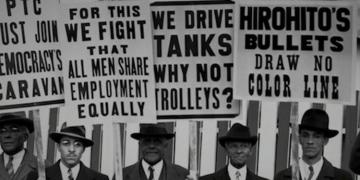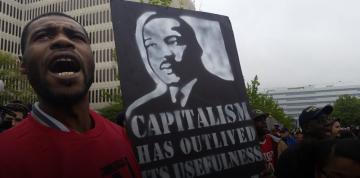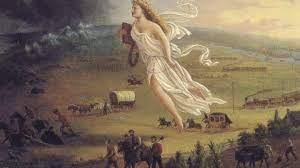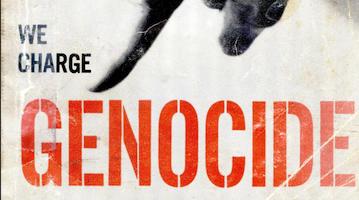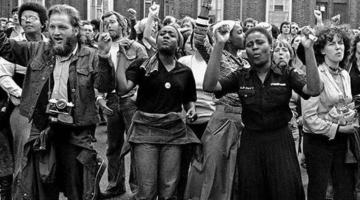Bell levels a class critique against the Black bourgeoisie, whom he sees as having led Black political protest down the wrong path time and time again.
“Bell favored a cyclical view of history in which Black people experience progress through interest convergence and setbacks under racial sacrifice.”
Recent debates about Critical Race Theory (CRT) have been abysmally uninformed at best and utterly inaccurate at worst. From corporate media and right-wing rags to independent left media, almost everyone has misrepresented or misunderstood the origins, histories, and theories of what is today known as CRT. This three-part series corrects these misunderstandings. Part 1 provides an overview of the work of Derrick Bell, the “father of critical theory.” Part 2 provides a detailed intellectual history of CRT. Part 3 presents a critique of intersectionality as an idealist, liberal iteration of CRT. The debates about Critical Race Theory (CRT) have raged in Amerika for over a year now. Though defenders and detractors alike claim to know what CRT “really” is, none of them have taken care to examine the philosophy of Derrick Bell, a man who is widely considered the “father of critical race theory.” Even Kimberlé Crenshaw, who has been treated as the foremost authority on CRT as of late, once referred to Bell as “as scholar who lit the path toward Critical Race Theory” and one to whom scholars of CRT “owe an enormous intellectual debt.” Some commentators have suggested that Bell’s CRT is a liberal philosophy. But unlike most of what passes as CRT today, Bell’s CRT is actually rooted in the Black Radical Tradition, with explicit roots in Black Nationalism and anticolonialism. Bell takes his inspiration from Paul Robeson, Frantz Fanon, Robert L. Allen, and the later writings of W. E. B. Du Bois. The tone of his writing and the strategies he offers more closely resemble Black Power than The Audacity of Hope. Derrick Bell’s version of CRT has nothing to do with the version of CRT now championed by liberal academics, Democratic party functionaries, corporate media mouthpieces, and the elites of the military-industrial complex.
By highlighting three of the most dominant themes in Bell’s CRT—materialism, realism, and anticolonialism—it becomes possible to understand the aspects of Bell’s philosophy that make it far more radical than the watered-down liberal ideology being trafficked as CRT today.
Bell was born in 1930 in Pittsburgh, Pennsylvania, and in 1957, he completed a law degree at the University of Pittsburgh School of Law. Bell was highly active in civil rights litigation during the 1950s and 60s. After a brief appointment in the civil rights division of the U.S. Justice Department, Bell resigned to work full time for the NAACP’s Legal Defense and Educational Fund. During this time, Bell worked on dozens of desegregation cases, giving him firsthand experience where ligation and activism overlap.
“Bell takes his inspiration from Paul Robeson, Frantz Fanon, Robert L. Allen, and the later writings of W. E. B. Du Bois.”
In 1967, Bell left the NAACP to take up academic work, first at the University of Southern California and later at Harvard Law School. At Harvard, Bell developed a critique of the civil rights movement’s litigation strategies, and this critique provided Bell with the foundational principles of CRT. In 1973, Bell published his groundbreaking textbook Race, Racism, and American Law, the first law textbook to examine the racial implications of U.S. legal structures. During the 1980s, Bell would move from university to university, often leaving to protest the refusal of schools to hire more faculty of color. In 1991, he began teaching at New York University, where he would remain active until his death in October 2011.
The first theme in Bell’s CRT is materialism, which provides the basis for his theory of racial fortuity. Like other materialists, Bell argues that economic factors provide the foundation for other social and political phenomena and that people are primarily motivated by interests rather than moral considerations. In Silent Covenants, Bell asks: “What are the motivations, the invisible forces, that move both individuals and groups to function so predictably across time and a wide variety of conditions as to ensure a perpetually subordinate role for all but a fortunate few of those Americans who are not white?” His answer: economic interests. Referring to “racism’s economic foundation,” Bell concludes that Black people are trapped in “a giant, unseen gyroscope” of white decision making that always puts white interests before the interests of racialized groups.
Bell’s theory of racial fortuity is grounded in his materialism. Because people act based on their interests and because white people hold the majoritarian power position in Amerika, Bell concludes that the conditions Black life in the U.S. depend on whether Black interests coincide with white interests. In instances where there is “interest convergence,” Black and white interests align and Black people achieve legal and social wins. When such convergence ends, however, white people not only cease their support for Black interests but often being actively opposing Black interests in a process Bell calls “racial sacrifice.” Bell calls this process racial fortuity because the lives and well-being of Black people remain subject to chance, caught between interest convergence and racial sacrifice.
“Black people are trapped in “a giant, unseen gyroscope” of white decision making.”
Through the lens of racial fortuity, Bell rejects the liberal view of history as one of racial progress, favoring instead a cyclical view of history in which Black people experience progress through interest convergence and setbacks under racial sacrifice. For example, Bell argues that the Emancipation Proclamation and the Civil War Amendments to the U.S. Constitution are instances of interest convergence. In the first case, ending slavery was a means to the end of “saving the union”; in the second case, the amendments helped the Republicans maintain control of Congress. However, these instances of interest convergence were followed by two instances of racial sacrifice: the Tilden-Hayes compromise, which ended Reconstruction, and the disenfranchisement of Black voters in the South, which prevented Black voters from influencing elections in those states.
For Bell, the most important example of interest convergence is the Supreme Court decision in Brown v. Board of Education, which ruled that racial segregation is unconstitutional. Bell originally argued this in his 1980 paper “Brown v. Board of Education and the Interest-Convergence Dilemma,” where he posited that the Court’s decision resulted not from a moral concern about Black well-being under Jim Crow regimes but from three international and domestic interests. Internationally, the U.S. needed to end segregation because it embarrassed the country on the world stage and undermined Cold War imperatives. Bell’s thesis was later corroborated by historian Mary Dudziak, who demonstrated that the Supreme Court wanted to end segregation because the Soviet Union and Third World anticolonial movements were using Jim Crow to criticize Amerika. Domestically, the U.S. needed to end segregation because it needed to gain Black support for Cold War foreign policy and because segregation was viewed as a barrier to industrialization in the South.
Thus, Bell’s materialism inspires his theory of racial fortuity, which interprets even the most celebrated events of Amerikan racial history as cynical decisions designed to advance capitalists and imperialist ends.
“The U.S. needed to end segregation because it embarrassed the country on the world stage and undermined Cold War imperatives.”
The second theme in Bell’s CRT is realism, which provides the basis for his theory of racial realism. Bell’s realism begins with an emphasis on the empirical realities of Black people in Amerika. On this view, CRT politics beings with historical and sociological descriptions about what is rather than with idealistic hopes about what might be. But for Bell, when we examine the patterns of racial fortuity in Amerikan history, we should reach the obvious conclusion: there is no empirical reason to believe that racism and white supremacy will ever come to an end in Amerika. In other words, U.S. history suggests that racism is permanent and racial equality is impossible. To be sure, Bell does not mean that racism is an ahistorical or eternal phenomenon; rather, he says that nothing in Amerikan history would make any reasonable person believe that racism will end in the U.S.
Bell has gotten a lot of heat from critics who claim that racial realism leads to inaction, pessimism, and fatalism. But Bell argues that the problem is not the struggle but the aim of the struggle. Too much energy and too many resources, Bell writes, have been wasted chasing the unrealistic goal of racial equality. But that just means that the struggle should aim for something else. As Bell writes in his famous 1992 essay “Racial Realism,” “Racial Realism…requires us to acknowledge the permanence of our subordinate status. That acknowledgement enables us to avoid despair, and frees us to imagine and implement racial strategies that can bring fulfillment and even triumph.” In his follow-up book Afrolantica Legacies, Bell lays out seven “rules of racial preservation,” guidelines designed to help Black people survive and even thrive in a perpetually white supremacist empire.
Thus, Bell’s realism inspires his theory of racial realism, which views Amerikan society as permanently racist and which advocates survival strategies as a more effective and realistic alternative to traditional civil rights calls for racial equality.
The third theme in Bell’s CRT is anticolonialism, which provides the basis for his critique of the Black middle class. In Afrolantica Legacies, Bell draws upon Robert L. Allen’s Black Awakening in Capitalist America, which argues that the elite of the 1960s were implementing a program of “domestic neocolonialism.” According to Allen, the white Amerikan elite were happy to integrate politically convective middle class Blacks into the power structure because it would protect the status quo from accusations of racism while giving those same middle class Blacks a stake in the system. By becoming beneficiaries of the Amerikan capitalist empire, Black middle class citizens were increasingly likely to identify with and defend it.
“Belll views Amerikan society as permanently racist and which advocates survival strategies as a more effective and realistic alternative to traditional civil rights calls for racial equality.“
Following Allen, Bell explains neocolonialism and the class role the Black bourgeoisie plays in a neocolonial regime: “The colonizing countries maintained their control by establishing class divisions within the ranks of the indigenous peoples. A few able (and safe) individuals were permitted to move up in the ranks where they served as symbols of what was possible for the subordinated masses. In this, and less enviable ways, these individuals provide a legitimacy to the colonial rule that it clearly did not deserve.”
Bell levels a class critique against the Black bourgeoisie, whom he sees as having led Black political protest down the wrong path time and time again. He criticizes NAACP lawyers for advancing the organization’s demand for integrated schools at the expense of their constituents' demands for better Black schools. He condemns high-profile conservative Black politicians and judges, such as Clarence Thomas, referring to them as “overseers.”
Bell even directs some of this criticism toward himself. As a member of the middle class Black intelligentsia, Bell fears he and others like him reinforce the myth of racial progress merely by accepting prestigious academic appointments. “Instead of gaining access to real influence,” he writes in Afrolantica Legacies, “it is more likely that we are legitimizing a system that relegates us to an ineffectual but decorative fringe.” While Bell wanted to use his legal training and racial consciousness to improve Black life, he worried that he might inadvertently be just another neocolonial stooge.
Thus, Bell’s anticolonialism inspires his class critique of the Black bourgeoisie, causing him to be wary of Black middle class efforts to integrate themselves into, and thereby validate, the existing white-capitalist power structure.
This brief overview of Bell’s philosophy should make it clear to even the most casual observer that his version of CRT stands in stark contrast to the liberal versions of CRT now proliferating in corporate newsrooms, the halls of academia, and the lobby of the Pentagon.
“Bell’s anticolonialism inspires his class critique of the Black bourgeoisie.”
In fact, Bell’s Black radical CRT can be used to understand and explain the rise of liberal CRT at this moment. The now-popular liberal CRT is advanced primarily by upper middle class Black intellectuals and journalists, on one hand, and politically liberal whites, on the other. Such CRT expresses its demands in the language of morality and justice. And, at least rhetorically, such CRT holds out hope that, one day, racial equality might be achieved in “America.” Here we have a neocolonial Black bourgeoisie seeking interest convergence with liberal whites so both parties can hold onto their power and economic status in the face of a wave of Trump-led right-wing reaction, all while continuing to propagate the myths of “American Exceptionalism.”
Derrick Bell’s CRT, the original articulation of Critical Race Theory, is far too radical for mainstream Amerika—especially those parties who have a stake in perpetuating the status quo and those parties who seek access to power without challenging capitalism, imperialism, and colonialism. Given the diametrical opposition between Bell’s CRT and contemporary liberal-patriotic CRT, it comes as no surprise that Bell is missing from the debate. For if Bell’s philosophy became part of the debate, the establishment functionaries who claim to carry the mantle of CRT today would be exposed for the pseudo-radical frauds that they are.
Patrick D. Anderson is an Assistant Professor of Philosophy at Central State University. His research focuses on the Anticolonial Tradition of Black Radical Thought and the connections between technology, ethics, and imperialism. In addition to contributing to Mint Press News and Black Agenda Report, Patrick is editor at the WikiLeaks Bibliography. He can be reached at anderpat@gvsu.edu.
COMMENTS?
Please join the conversation on Black Agenda Report's Facebook page at http://facebook.com/blackagendareport
Or, you can comment by emailing us at comments@blackagendareport.com






